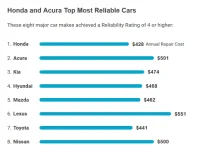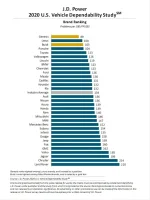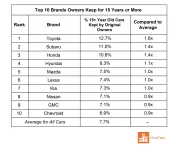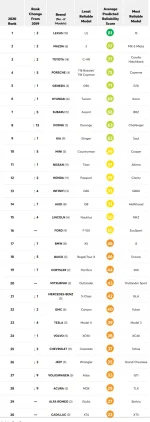I bring up Genesis as this is a Genesis forum. Genesis cannot make the list.
So you refuse to acknowledge any reliability study if Genesis is a brand is not mentioned on it, despite vehicles like the Hyundai Genesis existing some 8 years before Genesis became its own brand? Granted, it's not part of the 15+ year longevity chart either, but Genesis will never be counted in any long-term reliability study until it actually becomes old enough to do so. So right now, we're left with Hyundai.
Does that prove than brands not on the list are lesser quality?
Quality =/= longevity. German vehicles have much higher quality materials and fit and finish than a Hyundai Elantra- doesn't mean they'll outlast an Elantra.
If you want to show quality, show how many cars built in a given model year are registered and on the road after 15 years.
Again, that's not what "quality" means. If you're referring to longevity, then yes, that would also be a decent assessment. But if a car is passed around 4 times in 15 years with low miles, that's a sign that none of the owners were very happy with the car to each keep it in such a short span of time.
There is some correlation on the top brands listed but it is not definitive of anything other than Toyota owners keep their cars for a longer time than the average Ford owner.
That a first owner would keep a car 15 years demonstrates their satisfaction with the vehicle. For most, satisfaction would be simply be having their car run without breaking down on them. Like it or not, that list doesn't deviate much from other reliability assessments online like Repair Pal, which measure cost, severity, and frequency of issues:

I did not say the J D Powers list was better. It only measure problems per unit in a given time. It is saying that a car that had, lets say a radio knob fall off and a window button stick is not as good a quality as the other car that had the transmission fall out.
It measures the frequency of problems reported to dealerships, not the severity of the problem itself. A transmission falling out would be counted the same as a window stick button in value. That's why its rankings are inconsistent with most other assessments that place German and American brands where they belong in reliability and longevity- at the bottom.
Both lists are marketing tools.
I'd love to see the last time iSeeCars was ever featured in a car commercial.
No it doesn't show longevity. You're INFERRING longevity from how long the first owner keeps the car.
If any owner keeps their vehicle 15+ years, it's a sign that the vehicle itself can last over 15+ years and not troubling to the extent where the owner feels they're better off without it. If you can find me a better definition of "longevity", go ahead and do so.











